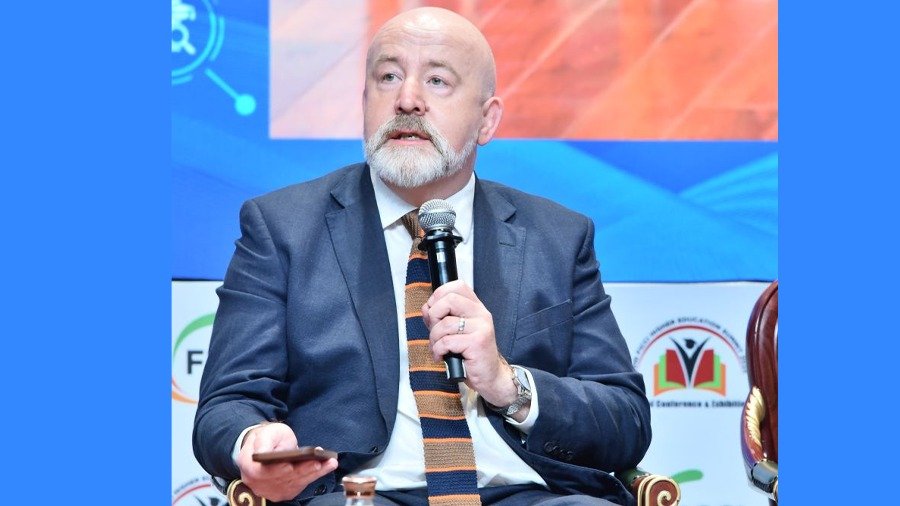
Speaking at the 20th FICCI Higher Education Summit, Prof. Mark Lee, Deputy Vice-Chancellor and Professor of Artificial Intelligence at the University of Birmingham, highlighted how the institution’s century-old ties with India continue to evolve through collaborative research, impactful innovation, and education that bridges academia and industry.
Prof. Lee began by saying that this year marks a major milestone for the University of Birmingham — its 125th anniversary. “We are immensely proud of our long-standing partnership with India, a relationship that goes back more than a century,” he said.
The university’s connection with India dates back to 1909, when its first Indian students were admitted. Today, over 1,500 Indian students study across its campuses, supported by 681 Indian faculty members, and the university is engaged in 40 active joint research projects with Indian institutions. These collaborations span multiple disciplines — from artificial intelligence to medicine, history, engineering, and basic sciences — underscoring the university’s commitment to global academic partnerships.
Building Networks of Scale
Prof. Lee emphasised the importance of collaboration at scale as a driving force for meaningful research outcomes. Citing the example of the Global Surgery Network led by Professor Dion Morton, he explained how the initiative brings together multicentre collaborations from around the world to address major surgical challenges, especially in cancer treatment.
“In India, the India HOPE project, based at Christian Medical College, Ludhiana, coordinates research across 101 hospitals throughout the country,” he shared. “This network is now recognised as the largest scientific collaboration of its kind in the world.”
For Prof. Lee, such networks demonstrate a fundamental truth about scientific progress: “You can achieve so much more with collaboration, with large partnerships, and with access to vast amounts of data and knowledge from right across the world.”
Generating Impact Through Interdisciplinary Research
The second major theme of Prof. Lee’s address focused on how interdisciplinary collaboration can create tangible impact on society.
He pointed to a significant initiative — a Memorandum of Understanding signed with the Government of Haryana to establish the Haryana–UK Centre of Excellence on Sustainable Crop Post-Harvest Management and Cold Chain, led by Professor Toby Peters.
“This centre will provide training and demonstration facilities to develop sustainable refrigeration and cold-chain solutions,” he explained. “In practical terms, this means fewer food shortages, more profits for farmers, and a step forward in tackling global food insecurity.”
The initiative exemplifies how academic research, when applied to real-world challenges, can generate far-reaching socio-economic benefits. “It is about moving research beyond the lab to make a real difference on the ground,” he stressed.
Integrating Education, Research, and Industry
Another cornerstone of the University of Birmingham’s global engagement strategy, Prof. Lee noted, lies in integrating education with research and industry relevance.
“In partnership with IIT Madras, we have developed a range of joint programmes — the first being in Data Science and Artificial Intelligence, launched three years ago,” he said. “We have since added Sustainable Energy Systems, with several more programmes in the pipeline.”
These collaborations go beyond traditional academic exchange. “We co-teach, co-supervise student projects, and build research partnerships as we teach,” he shared. “Too often, teaching and research are seen as separate domains — but we believe they are deeply interconnected. When we engage students in research early, we nurture them as future scientists, innovators, and leaders.”
This approach, he argued, transforms the classroom into a laboratory of ideas, where students learn not just theory but the practice of collaborative problem-solving — a key skill in today’s global knowledge economy.
Lessons in Collaboration and Innovation
Reflecting on the university’s partnerships and projects, Prof. Lee identified three core lessons learned from their experience.
“The first lesson,” he said, “is to start with clearly defined, real-world problems — whether in surgery, post-harvest food management, or other practical domains that change lives. Programmes framed around such challenges create shared agendas for universities, industries, hospitals, and governments to work together on real solutions.”
The second, he explained, is the value of scale: “Large, multi-partner collaborations bring diversity of expertise and depth of data, leading to more robust and impactful research outcomes.”
Finally, he stressed the importance of viewing education and research as “one continuous pathway.” As he put it, “Our students are our future researchers and professors. The earlier we involve them in meaningful research, the stronger our collective capacity for innovation becomes.”
Looking Ahead
In closing, Prof. Lee reaffirmed the University of Birmingham’s deep commitment to its partnership with India and its mission to shape a future built on shared knowledge and innovation.
“It has been a privilege to share how the University of Birmingham is working hand in hand with Indian institutions to create knowledge, solve global challenges, and shape a better future for all,” he concluded.
Leave a Reply